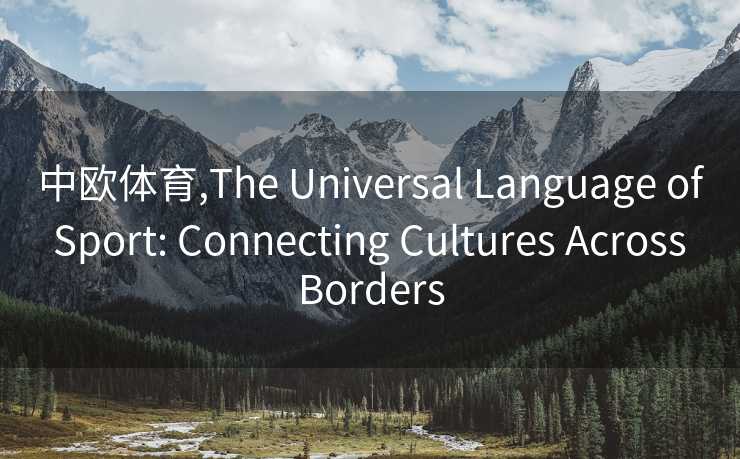Sport, often called the "universal language," transcends geographical, linguistic, and cultural barriers to unite people worldwide. From the dusty pitches of Brazilian favelas to the polished courts of Madison Square Garden, athletic competitions serve as a shared stage where nations celebrate triumphs, mourn defeats, and rediscover their collective humanity. This global phenomenon is not merely about winning medals or breaking records; it’s a dynamic force that shapes identities, fosters empathy, and redefines what it means to belong to a community.


Football: The World’s Most Beloved Unifier
No sport embodies global unity quite like football (soccer). With over 3.5 billion fans—nearly half the world’s population—the FIFA World Cup stands as the planet’s most-watched event. For a month every four years, flags wave in streets from Tokyo to Tunis, and rivalries dissolve into collective joy. Consider Brazil: a nation where football isn’t just a game but a cultural pillar. In Rio de Janeiro’s Maracanã Stadium, fans chant in Portuguese, Spanish, and even broken English, united by their love for Pelé or Neymar. Even during conflicts, football becomes a tool for peace. In 2018, when North and South Korea fielded a joint women’s team at the Asian Games, the gesture symbolized hope amid political tension—a reminder that sport can bridge divides where diplomacy sometimes fails.
Basketball: From Local Courts to Global Icons
Basketball, born in a Massachusetts gymnasium, has evolved into a global powerhouse thanks to the NBA. Players like Michael Jordan and LeBron James aren’t just athletes; they’re cultural ambassadors. Jordan’s Air Jordan sneakers, once banned in the NBA for violating uniform rules, became a symbol of aspiration for youth in China, Nigeria, and beyond. Today, the league boasts international stars such as Giannis Antetokounmpo (Greece) and Luka Dončić (Slovenia), whose stories of perseverance resonate with fans worldwide. In Lagos, Nigeria, street basketball courts buzz with activity as kids mimic NBA moves, dreaming of stardom. This cross-pollination of styles—American athleticism fused with African creativity—shows how sport fosters innovation and mutual respect.
Cricket: A Legacy of Empire and Evolution
Cricket, often dubbed the "gentleman’s game," carries a complex legacy tied to British colonialism. Yet in modern times, it has become a unifying force in former colonies like India, Australia, and Pakistan. The Indian Premier League (IPL), launched in 2008, revolutionized the sport by blending fast-paced action with Bollywood glamour. Matches draw crowds of 80,000-plus, uniting Hindus, Muslims, and Sikhs in celebration. In Pakistan, despite political instability, cricket matches between archrivals India and Pakistan are treated as national events—proof that sport can momentarily override historical tensions. Even in England, where cricket originated, the sport now embraces diversity: players of Caribbean, South Asian, and African heritage represent the nation, reflecting its multicultural identity.
The Olympics: A Stage for Human Solidarity
If any event encapsulates sport’s power to connect, it’s the Olympic Games. Every two years, athletes from 206 nations gather, carrying not just their country’s flag but also stories of struggle and resilience. Take Refugee Olympic Team members: swimmers who fled war-torn Syria, runners who escaped poverty in South Sudan. Their presence reminds us that sport is a right, not a privilege, and that talent knows no borders. At the 2020 Tokyo Games, skateboarder Sky Brown (half-Japanese, half-British) became the youngest Olympian, inspiring a generation of mixed-heritage athletes. Meanwhile, the Paralympics challenge perceptions of disability, showing that determination can turn limitations into strengths.
Beyond Competition: Sport as a Catalyst for Change
Sport’s impact extends far beyond the field. It drives social progress: soccer clubs in Colombia use the sport to steer youth away from gangs; tennis programs in Rwanda empower women through education. It also champions equality: the WNBA’s fight for equal pay, Colin Kaepernick’s kneeling protest against racial injustice, and LGBTQ+ athletes like Megan Rapinoe using their platform to advocate for rights. These acts prove that sport is not neutral—it reflects society’s values and has the power to reshape them.
In a world often divided by politics, religion, and economics, sport remains a rare constant. It teaches us that victory tastes sweeter when shared, that defeat feels lighter when supported, and that our differences matter less than our shared humanity. As we cheer for our teams, we’re not just watching a game—we’re participating in a global conversation. And in that conversation, we find hope: that one day, the world might play as well as it competes.